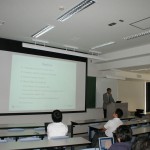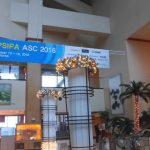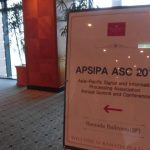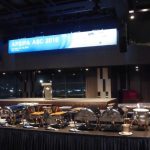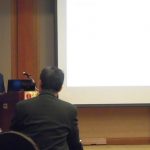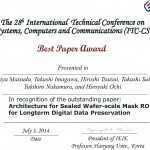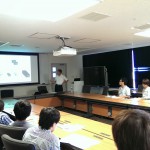A technical lecture related to 3D video processing was given by Prof. Yo-Sung Ho from GIST. The details are the following.
Date: 13:00-15:00, Aug. 26, 2013
Room: Room A22, Grad School of IST Building, Hokkaido University
Title: Depth-based Techniques for 3D Video Processing
Lecturer: Professor Yo-Sung Ho (Gwangju Institute of Science and Technology)
Cosponsored by IEICE Hokkaido Section and IEEE Sapporo Section.
Abstract: In recent years, significant advances have been made in the development of computational methods for predicting 3D scene structure from a single monocular image. However, their computational complexity severely limits the adoption of such technologies to various computer vision and image processing applications. In this talk, we are going to explain various problems of 3D video processing based on the depth information of the scene. After reviewing the current status of 3DTV research activities, we are going to cover several challenging issues of 3D video capturing, such as camera calibration, image rectification, illumination compensation and color correction. We are also going to discuss related 3D video processing techniques, including prediction structure for 3D video coding, 2D video-plus-depth coding, and intermediate view synthesis at virtual viewpoints.
Lecturer’s CV: Yo-Sung Ho received the B.S. and M.S. degrees in electronic engineering from Seoul National University, Seoul, Korea, in 1981 and 1983, respectively, and the Ph.D. degree in electrical and computer engineering from the University of California, Santa Barbara, in 1990. He joined ETRI (Electronics and Telecommunications Research Institute), Daejon, Korea, in 1983. From 1990 to 1993, he was with Philips Laboratories, Briarcliff Manor, New York, where he was involved in development of the Advanced Digital High-Definition Television (AD-HDTV) system. In 1993, he rejoined the technical staff of ETRI and was involved in development of the Korean DBS Digital Television and High-Definition Television systems. Since September 1995, he has been with Gwangju Institute of Science and Technology (GIST), where he is currently Professor of Information and Communications Department. Since August 2003, he has been Director of Realistic Broadcasting Research Center (RBRC) at GIST in Korea. His research interests include Digital Image and Video Coding, Image Analysis and Image Restoration, Three-dimensional Image Modeling and Representation, Advanced Source Coding Techniques, Three-dimensional Television (3DTV) and Realistic Broadcasting Technologies.
-
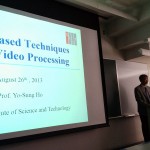
-
